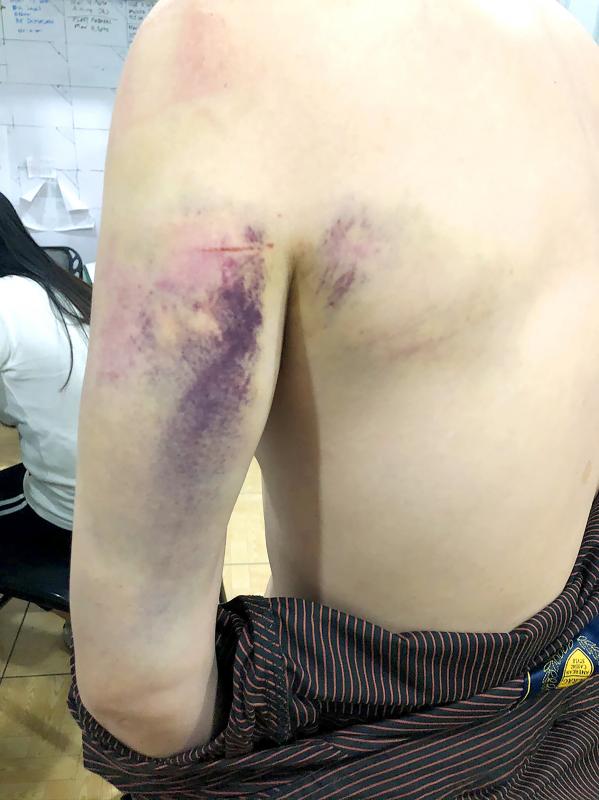A Taiwanese man was allegedly kidnapped and held for two days without food or water after arriving in the Philippines for a job in the gambling industry, the Taipei Economic and Cultural Office (TECO) in the Philippines said on Monday.
The incident was the 10th case this year of a Taiwanese reportedly being kidnapped and extorted after becoming involved with Philippine gambling companies.
The man, surnamed Yeh (葉), found a job posting online for a company based in Makati in Metro Manila, TECO police attache Jerry Wang (王智勇) said.

Photo: CNA
Yeh refused to accept the job after he was taken to a location different from the one he was told, Wang said.
Company employees then allegedly handcuffed and beat Yeh, and demanded 15,000 yuan (US$2,200) for his release, he said.
Yeh’s girlfriend e-mailed the office, saying: “The original person said that the job was in Makati, but they sent him to Pasay. After taking his passport, they said he was sold to someone else. He refused the job, so they kidnapped him and asked for a 15,000 yuan ransom. I have not been able to get hold of him after last speaking with him at 7pm on Sept. 15.”
The office contacted the woman for more information and the same evening requested assistance from the Philippine National Police Anti-Kidnapping Group, Wang said.
Officers on Sept. 17 set out to raid the building where they suspected Yeh was being held, but while en route received a message that he had been traded to a third company, Wang said.
Yeh’s girlfriend set up a meeting with the company, but when they brought Yeh to the site, Philippine police were waiting for them, he said.
Wang said that Yeh’s captors had beat him with rods, causing extensive bruising on his back, left shoulder and arm.
Yeh said that he was handcuffed and for two days “did not receive any food or water.”
“I had to drink my own urine to survive,” he said.
It was only after he was transferred to the third company that he was given something to eat, he said.
Yeh thanked Philippine police and the office, saying that he was rescued and escaped more serious harm due to their hard work and a bit of luck.
Representative to the Philippines Michael Hsu (徐佩勇) said that he was pleased with the rapid response.
Since 2018, 32 Taiwanese have been reported kidnapped or detained by groups in the Philippine gambling industry over disputes or outstanding loans, prompting repeated warnings from TECO, Hsu said.
Although the office and Philippine police have rescued and repatriated victims, the physical and emotional scars they are left with are harder to heal, Wang said.
Taiwanese have become the main target of Philippine gambling firms, as Chinese in the industry were instructed to return before Feb. 8 or risk cancelation of their passports, freezing of bank accounts and confiscation of property, Wang said.
Those interested in entering the industry should collect as much information as possible — including the company’s legal status, contract details and actual work expectations — and assess the risk accordingly, he said.

CHANGING LANDSCAPE: Many of the part-time programs for educators were no longer needed, as many teachers obtain a graduate degree before joining the workforce, experts said Taiwanese universities this year canceled 86 programs, Ministry of Education data showed, with educators attributing the closures to the nation’s low birthrate as well as shifting trends. Fifty-three of the shuttered programs were part-time postgraduate degree programs, about 62 percent of the total, the most in the past five years, the data showed. National Taiwan Normal University (NTNU) discontinued the most part-time master’s programs, at 16: chemistry, life science, earth science, physics, fine arts, music, special education, health promotion and health education, educational psychology and counseling, education, design, Chinese as a second language, library and information sciences, mechatronics engineering, history, physical education

The High Prosecutors’ Office yesterday withdrew an appeal against the acquittal of a former bank manager 22 years after his death, marking Taiwan’s first instance of prosecutors rendering posthumous justice to a wrongfully convicted defendant. Chu Ching-en (諸慶恩) — formerly a manager at the Taipei branch of BNP Paribas — was in 1999 accused by Weng Mao-chung (翁茂鍾), then-president of Chia Her Industrial Co, of forging a request for a fixed deposit of US$10 million by I-Hwa Industrial Co, a subsidiary of Chia Her, which was used as collateral. Chu was ruled not guilty in the first trial, but was found guilty

DEADLOCK: As the commission is unable to forum a quorum to review license renewal applications, the channel operators are not at fault and can air past their license date The National Communications Commission (NCC) yesterday said that the Public Television Service (PTS) and 36 other television and radio broadcasters could continue airing, despite the commission’s inability to meet a quorum to review their license renewal applications. The licenses of PTS and the other channels are set to expire between this month and June. The National Communications Commission Organization Act (國家通訊傳播委員會組織法) stipulates that the commission must meet the mandated quorum of four to hold a valid meeting. The seven-member commission currently has only three commissioners. “We have informed the channel operators of the progress we have made in reviewing their license renewal applications, and

Taiwan-based publisher Li Yanhe (李延賀) has been sentenced to three years in prison, fined 50,000 yuan (US$6,890) in personal assets and deprived political rights for one year for “inciting secession” in China, China's Taiwan Affairs Office spokesman Chen Binhua (陳斌華) said today. The Shanghai First Intermediate People’s Court announced the verdict on Feb. 17, Chen said. The trial was conducted lawfully, and in an open and fair manner, he said, adding that the verdict has since come into legal effect. The defendant reportedly admitted guilt and would appeal within the statutory appeal period, he said, adding that the defendant and his family have